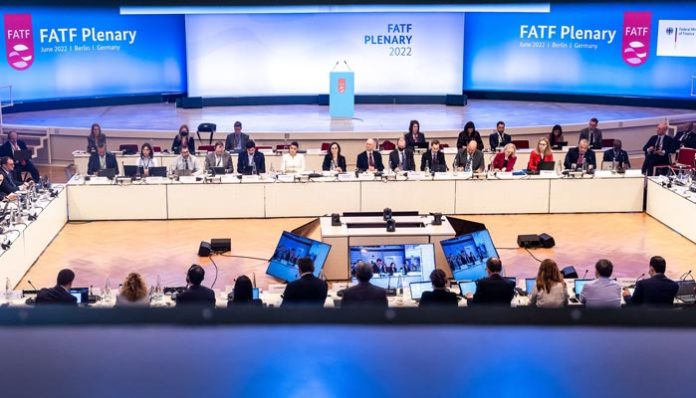In line with expectations, the Financial Action Task Force (FATF) has announced that Pakistan has fully met all 34 action items in its 2018 action plan.
However, it has not completely exited the grey list as there is still one more step left — an ‘on-site’ team visit — which could take up to nearly seven to eight months,
The FATF, established in 1989, sets international standards for preventing international financial crimes that aid terrorism. Pakistan has been on the FATF grey list since June 2018. It was first placed on the list in 2008 and removed in 2010 only to return to the list in 2012 and stay on it till 2015.
It has been back on the ‘grey list’, also known as the “increased monitoring list”, since 2018. In 2021, the global body emphasised that Pakistan needs to prosecute members of the UN-designated terror groups.
“Getting off the FATF grey list is a highly technical process, but at some point, the international community needs to recognise Pakistan for the genuine steps it has taken against certain militant groups and their leaders,” said Adam Weinstein, a research fellow specialising in Pakistan and Afghanistan at the Quincy Institute for Responsible Statecraft.
“Pakistan’s government initially focused on peripheral matters of concern rather than the core issues of terrorist financing and enforcement,” Weinstein said. “Let’s face it, there are many other countries that present a greater money laundering risk than Pakistan but aren’t greylisted. Pakistan was singled out due to terrorism.”
Pakistan’s economy is dependent on international investors. The removal from the list will boost its imports, exports, remittances, and access to international loans. Pakistan will have improved access to finances in the form of foreign direct investments and financial assistance from international donors, which would help the South Asian country shore up its teetering economy.
According to Weinstein, lifting Pakistan from the list will remove one more barrier to foreign direct investment, but many other self-inflicted ones will still exist. “It’s hard to calculate the impact of a greylisting because it incurs repetitional costs, deters foreign investment, and may even reduce consumer spending,” he said.
The international body was initially set to develop measures to combat money laundering, but after the 9/11 attacks, its role expanded to prevent terrorist financing. FATF standards now ensure a coordinated global response to prevent organised crime, corruption, and terrorism. It also works to help authorities to stop funding for weapons of mass destruction.
FATF delegates representing 206 members of the global network and its observers, including the International Monetary Fund (IMF), the United Nations, and the World Bank, attended the meeting.
“Removal from the grey list would be a big boost for Pakistan during a serious economic crisis,” Michael Kugelman, deputy director and senior associate for South Asia at Wilson Centre, said.
“…as investors/banks would no longer have to worry about any reputational risks associated with doing business with Pakistan while it’s on a watch list for terrorist financing,” Kugleman said in a post on Twitter.
Pakistan will now see an improvement in its bond market as grey-listed countries are the whipping boys of global rating agencies, which take no time in slapping downgrades on various fronts of the economy, deterring international investors.
The economy will start improving now as the new status will help promote investment opportunities, easing the financial burden on the government. Pakistan’s borrowing capacity is also going to see an upgrade as the move will streamline its ties with institutions like the United Nations, IMF, etc.
It will also help expand international trade as Pakistan is no longer a high-risk country. In a nutshell, Pakistan is now in a stronger position to come to grips with the issues like depreciating currency value, widening trade deficit, and runaway inflation.

















